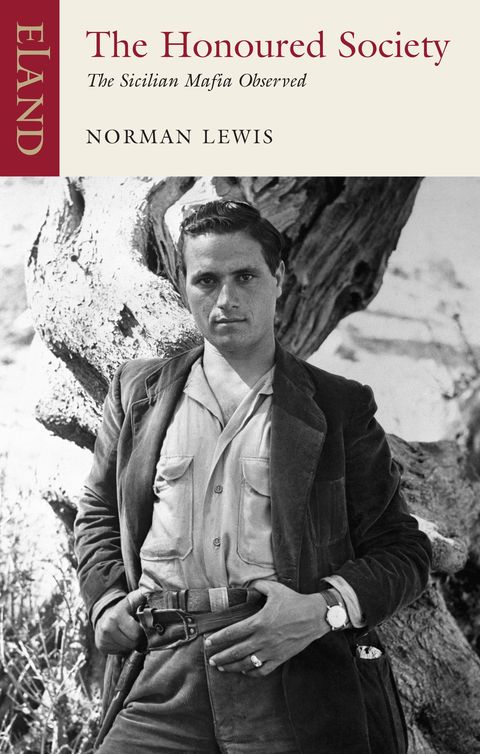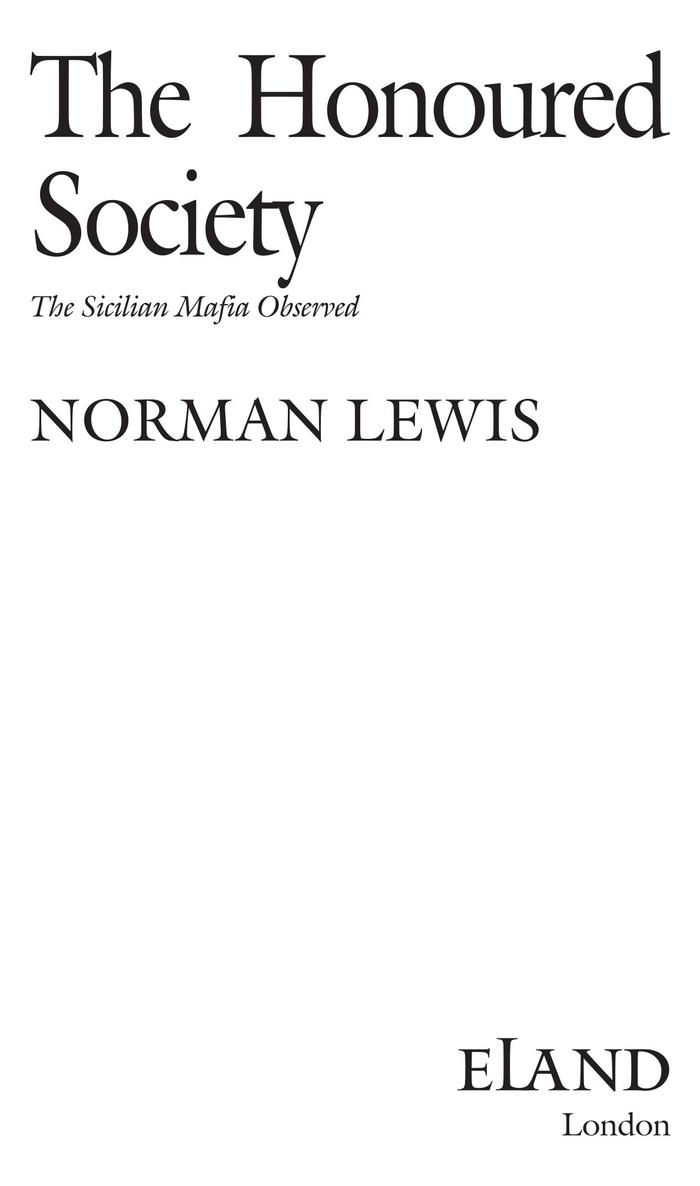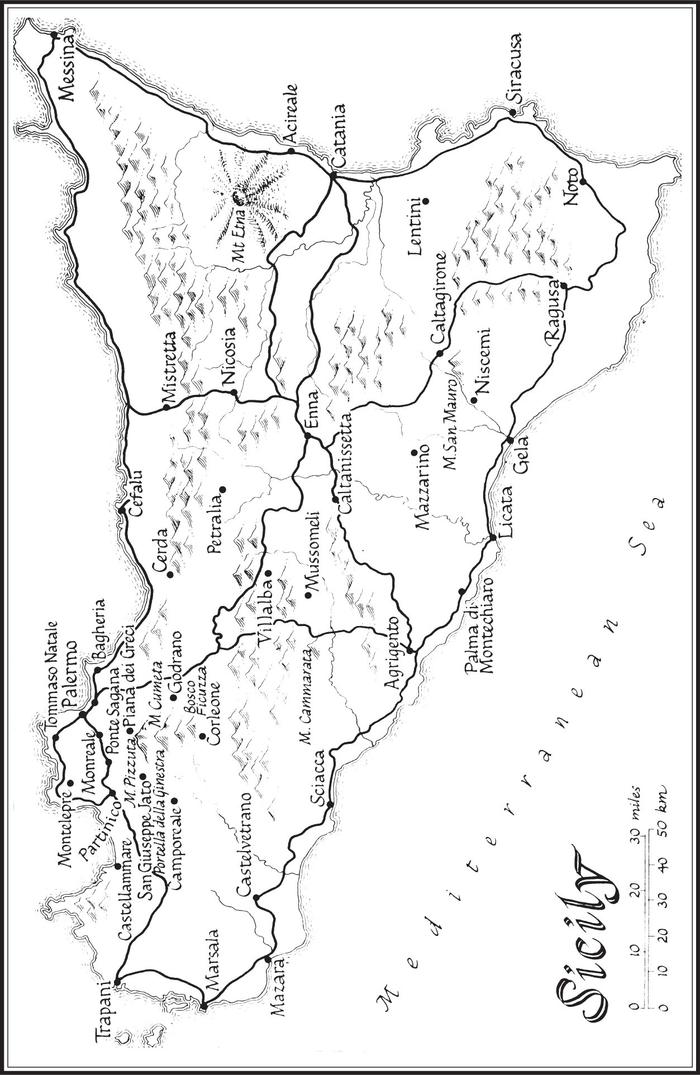Honoured Society
Authors: Norman Lewis



To S. J. Perelman

O
N JULY 10TH,
1943, the allied armies landed on the south coast of Sicily and, thrusting northwards, began their conquest of the island. The task of occupation was divided between the American and
combined
British and Canadian forces, the former including in their command a small contingent of Free French. The Anglo-Canadian army advancing up the east coast found an enemy poorly equipped to offer resistance. A great deal of ingenuity had gone into the construction of painted wooden cannon, artfully contrived to discharge firecrackers and thus draw fire, which deceived nobody. Key positions were defended by captured Russian guns which could not be fired because no one had been able to translate the operational manuals. Some battery commanders had no idea that they were about to be attacked as the telephone lines connecting them to their headquarters had not yet been laid. In one case, infantry rushed into battle had received an emergency issue of mouth organs but no ammunition. Yet all things considered, despite the fact that they were out-gunned, outnumbered by five to one, and faced by battle-toughened veterans of the Africa campaign, the Italians fought back well and sometimes desperately. It cost the British and Canadian army five slogging weeks, some stiff engagements, and several thousand casualties to reach their objective : the town of Messina on the northeast tip of the island.
The Americans, to whom had been allotted the seemingly stiffer proposition of subduing the mountainous centre and western half of the island, carried out their share of the operation with great speed. After a short initial period when the American Seventh Army seemed almost to be awaiting the signal to move, it suddenly began a brisk advance up two main roads towards Palermo, reaching the north coast of Sicily in only seven days and with hardly a shot fired. General Patton was to describe
this campaign as ‘the fastest blitzkrieg in history’. It was certainly the least costly : casualties, once the Seventh Army had broken out of its beachheads, being negligible.
The key-point in the Italo-German defence system was the area of Mount Cammarata near the towns of Villalba and Mussomeli, and here, in positions dominating both main roads along which the Americans were certain to advance, a mixed brigade of motorised artillery,
antiaircraft
guns and 88mm anti-tank guns, plus a squadron of German tanks, including several Tigers, waited to give battle. The Cammarata redoubt had been most carefully chosen. This craggy solitude, with its concealed ravines and its caves reached by secret paths, had been the home of armed resistance since Roman antiquity and had sheltered slave rebellions that had taken decades to quell. Only a few miles away, and in similar terrain, the bandit Giuliano was shortly to hold two fully equipped divisions in check with a force of only a hundred men. In command of the defenders was a Colonel Salemi, a veteran described as possessing an inflexible sense of duty. The Colonel was pessimistic about the final outcome of the battle in view of the lack of air-cover, but he had no doubt of his ability to halt the American advance for a valuable period of days, or even weeks. Cammarata might, in fact, have supplied a foretaste of the unhappy experience of Cassino.
* * *
On the morning of July 14th, four days after the landing, an American fighter plane flew low over the town of Villalba, circled and returned to drop a packet which fell near the church. A yellow flag with the letter L in black had been stretched over the side of the plane’s cockpit, and when the packet was picked up its contents were found to include a small replica of this flag. Packet and contents were handed over to Carabinieri Lance-Corporal Angelo Riccioli, now a sergeant-major in the service at Palermo, who has no objection to discussing the occurrence with an interested visitor. Next day the plane returned and a second packet was dropped, this time a short distance from the house of Villalba’s leading citizen – Calogero Vizzini – for whom it was intended. The packet was
recovered by a servant of the Vizzini family, Carmelo Bartolomeo, who must have been looking over his employer’s shoulder when it was opened, as he later told a newspaperman that he had seen a yellow silk handkerchief bearing the initial L. Bartolomeo’s employer, Calogero Vizzini – generally known as Don Calò – was the head of the Mafia of all Sicily, and as such considered by most Sicilians to be the most powerful man in the island.
Next morning, July 15th, a messenger left Villalba on horseback for the neighbouring town of Mussomeli. He was carrying a letter on behalf of Don Calò to Giuseppe Genco Russo, regarded at that time as second to Don Calò in the Mafia hierarchy. This letter, which the messenger had
been told to swallow if intercepted, was couched in Mafia jargon, and its substance was that a certain Mafia chieftain known as Turi would be leaving on July 20th to accompany the American motorised division as far as Cerda (within five miles of the north coast), while he, Don Calò, would be going on the same day with the main body of the army. Genco Russo was asked to do all he could in Don Calò’s absence for the security and the comfort of the Americans.
On July 20th, in fact, while the advance guard of the Seventh Army was still thirty miles away, a solitary jeep made a dash to reach Villalba and carry off the indispensable Don Calò. The jeep, however, took a wrong turning, came under fire from an Italian patrol, and one of its crew was killed. Later that day three American tanks repeated the attempt and were successful. One of these was flying the by now familiar yellow flag with the black L, and when in the main square an officer climbed out of its turret, he spoke in the authentic Sicilian dialect of the region.
Citizens of Villalba who were present at the encounter between this officer and the formidable Don Calò say that the American seemed surprised by the presence in the flesh of the legendary Mafia chief. Characteristically, Don Calò appeared on the scene in his shirtsleeves and braces, waddling unemotionally towards the group of nervous and excited American soldiers standing under the guns of their tanks. At this time he was sixty-six years of age, a man of bulky features and inert expression, but with eyes that moved like lizards. Don Calò’s slovenly dress and laconic speech were typical Mafia affectations. It was not done for a Mafia chieftain to show off in the matter of his clothing or any other way, and sometimes, as in Don Calò’s case, this lack of concern for appearances was carried to extremes. From the Prince of Lampedusa’s description, Don Calò might well have been the twin brother of Don Calogero Sedara, the unshaven and unscrupulous mafioso mayor of
The Leopard.
Reaching the shadow of the guns, Don Calò pulled out of his pocket the yellow handkerchief that had been dropped by the plane, and showed it to the officers. He and a nephew, Domiano Lumia, who had returned from the United States a short time before the outbreak of war,
were invited to get into one of the tanks, which then moved off, followed by the others. During the whole confrontation Don Calò – true to his reputation for preferring action to speech – is reported not to have opened his mouth.
Next morning, July 21st, on the heights of Cammarata, visible from the town, two-thirds of Colonel Salemi’s men were found to have
deserted
. Some of them have since said that during the night they were approached by Mafia agents, who convinced them of the hopelessness of their position and supplied them with civilian clothes and whatever else was needed to get home to their families. The same day, the Italian Commander himself was arrested by a trick while passing through Mussomeli, and confined by the Mafia in the Town Hall. At four o’clock on the afternoon of the 21st, Moroccan troops under General Juin, who
had been waiting since dawn at the village of Riffi for an order to advance, received the expected signal from a Sicilian agent coming from Mussomeli and began to move forward. The battle of Cammarata was over without a shell having been fired.
Don Calò was away from his capital for six days. During this time the Seventh Army divided itself in two columns, one of which, striking directly north along the Agrigento-Palermo road, reached Cerda, where it was joined by the other column which had carried out a wide
encircling
movement through Gela, Piazza Armerina, Nicosia, Mistretta and Santo Stefano – all of them notorious as Mafia towns. As indicated in the letter to Genco Russo, Don Calò considered his mission to end at Cerda. Here other Mafia potentates were ready to shoulder his responsibility.
In reality, although at this time Don Calò was the accepted head of the Mafia, there were certain weak links in his chain of command. Mussolini’s vigorous attack on the ‘Honoured Society’, as it was called by its members, had shaken its structure and left it weaker, probably, than it had ever been. Many of the best Mafia brains had been hastily converted to Fascism. Others, in 1943, were still in
confino
and only just about to be released. In the heart of western Sicily, the stronghold of great feudal estates, Don Calò – who had been too wily even for Mussolini – remained absolute master; but in the coastal plain between Cerda and Palermo the Mafia satraps had become used to their independence and had to be handled with diplomacy. It would be Don Calò’s first task to repair this weakness in the organisation.
By the time Calogero Vizzini returned to Villalba the war in western Sicily was at an end. He had dedicated the whole of his life to what the Mafia calls ‘winning respect’, and his prestige was now enormous. He had been nicknamed by the Allies ‘General Mafia’. Whether or not he was responsible for American strategy in western Sicily, his followers certainly gave him the credit for it, and no one could deny that the Mafia had most efficiently cleared all obstacles in the path of the American advance, while in the east the British and Canadians were still fighting their way round the slopes of Etna and it was to be three more weeks before they reached their goal at Messina.
But the war in western Sicily had been terminated bloodlessly, rapidly, and to the satisfaction of all but a few diehard senior Axis officers like the unfortunate Salemi. The Sicilians, always anti-Fascist, to all intents and purposes were now anti-Italian too. In so far as the loyalties of kinship were felt they were towards America, where by 1943 two million Sicilians, or first-or second-generation Americans of Sicilian origin, were living in a prosperity that was almost incredible by island standards. Many islanders were totally dependent on money sent back by relations in the States. Moreover, American Intelligence had seen to it that the Sicilian component of the invading force was as high as fifteen per cent. Hatred of the war had become so intense that, shortly after the invasion began, there were cases of Sicilian civilians attacking and destroying Italian military camps left unguarded by the rushing of troops to the beach-heads. To the Sicilians, resistance of any kind only signified a painful delay in an occupation wholeheartedly desired by all.
* * *
There was a precedent for the display of yellow flags and handkerchiefs which heralded this happy conclusion of hostilities on the western
Sicilian
front. The exchange of silk handkerchiefs was commonly practised among the Mafia and had become the equivalent of a password when an identity had to be established. In 1922 a certain Lottò, an
associate-member
of the Mafia of Villalba, committed a murder so outrageously ill-planned and with such an arrogant disregard for any attempt at concealment, that his arrest and conviction were inevitable. This kind of overconfidence was in breach of Mafia rules, which called for
consultation
and approval at high level before a liquidation could be carried out. But, to have left a ‘man of honour’ to his fate would have damaged the authority and prestige of the Mafia and have caused Don Calò himself serious ‘loss of respect’. He therefore arranged to have Lottò declared insane and transferred to a criminal lunatic asylum at Barcellona, where Mafia infiltration had been particularly successful. Soon after Lottò’s arrival, he officially died. The ‘corpse’ was removed for burial in a specially prepared and ventilated coffin, after which Lottò was supplied
with false identity documents and smuggled away to the United States. On arrival in New York, he was met by a group of friends who had been warned to expect him, and to these he identified himself by the production of a yellow silk handkerchief given to him by Don Calò, which in this instance carried the initial C.
The bold black L on the flags flown at Villalba on these fateful days in July stood for Luciano. Lucky Luciano, originally Salvatore Lucania, had been born in Lercara Friddi, the next town of any size along the main road from Villalba to Palermo, and as head of the Mafia in the United States – which he had almost certainly become – Luciano would undoubtedly have been in regular contact with his opposite number in Sicily. In 1943, Luciano, who had been found guilty on sixty-two counts of compulsory prostitution, was serving a thirty–fifty years’ prison sentence. He had recently been transferred at the US Navy’s request from the State Penitentiary at Dannemara, a maximum security prison known to the criminal fraternity as ‘Siberia’, to the Great Meadows Penitentiary, where he was more conveniently accessible to parties of naval officers in plain clothes who went there to confer with him.
In February of that year – five months before the invasion of Sicily took place – he appealed through his lawyer, George Wolf, for a reduction of his sentence in consideration of ‘services rendered to the nation’. Following this, he appeared in 1945 before the State Parole Board, where some squeamishness seems to have been displayed by naval intelligence officers called upon to testify on his behalf. Whatever had been promised Luciano in return for his co-operation – and Luciano protested that it was his freedom – the naval authorities refused to be drawn in, and the fact that Luciano was eventually freed and deported to Italy was due to the action as a private individual of Commander Haffenden, a naval officer prominent in these negotiations, and his confidential letters to members of the Parole Board.